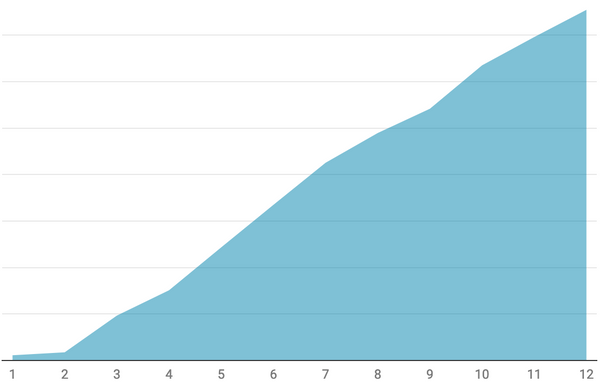How reframing discounts led to a 4x increase in yearly plans
How I increased my business' rate of yearly subscriptions by copying a storage company.

Back in May my wife and I decided to move out of our flat in Bristol.
By then we had already been living for a couple of months with my in-laws and it didn't make sense to keep paying £1k+/month in rent.
After some discussion, we decided to throw some money at the problem and put all our stuff in a storing facility.
I started googling storage companies in Bristol and I was quickly overwhelmed by the number of options (pro tip: don't start a storage business, it's ridicolously competitive).
Every company allowed me you to get an online quote by entering the size of the storing unit and how long I wanted to rent it for.
But one company did things differently.
On top of asking me the same two questions, UK Storage Company also asked me to choose a discount.

At first, I was confused.
I wondered why they would allow me to choose my own discount. Then I realised it was the good ol' "the longer you commit, the less you pay" gimmick.
Same technique, different framing.
UK Storage Company put me in the driver's seat and empowered me to make my decision.
That's when my brain started whirring and buzzing, and one question began to form in my head: what if I used the same framing for my SaaS product?
After all, cash-flow is king for (bootstrapped) startups and having people commit to yearly plans helps to lower churn.
Would that have any effect on how many people choose the longer plans (biannual or annual) over the monthly one?
That same day I tweeted about it and updated the checkout page of my app as shown below.

The results
After 7 weeks the experiment has been a great success.
With the new framing, the percentage of people who chose the biannual or annual plan has gone from 4.8% to 19%, a rather nice 395% increase.

I've done several pricing experiments over the years but none of them has been as successful and in such short space of time.
Perhaps even more interesting is that more than twice as many people chose the annual plan over the biannual plan.
My hunch is that this is due to the higher discount rate of the annual plan (35% for 12 months vs 15% for 6 months means an extra 5% discount when you choose the annual plan), which increases the perceived value.
Never stop experimenting
There's a small handful of levers you can pull to grow a business and pricing is probably the most underutilised one. Most SaaS businesses choose a pricing model and rarely, if ever, review it.
A better (and more profitable) approach is to run small experiments. If they work, incorporate them. If they don't, try something else.
Some people are scared that changing things will upset their customers but the truth is:
- you are allowed to change whatever you want about your business. You can always revert back. Nothing is fixed.
- in reality, nobody cares.
Do it yourself
If you want to try this experiment in your business, here are a couple of suggestions:
- don't overload people with options; have maximum 3. To nudge people towards one option, offer a substantially higher discount (like I did with the yearly plan)
- don't try to be sneaky and word the options properly. As you can see in my example, people know exactly what they get and how much they pay.
- ask people immediately after sign-up when they are in the right frame of mind. In my experience, asking people to switch to yearly plans a couple of months after they have used your product triggers many more questions in their mind, whereas by asking them before they try your product you're putting them in front of a simple decision: do I want to save money?
As people who work in the tech industry, we are all exposed to the same ideas, patterns and filters. This is why there's so little innovation and everyone just copies what everyone else is doing.
Sometimes all you need to do is to look at what companies in completely different industries operate. You might be suprised what a storage company can teach you.
PS: If you do try this experiment, let me know how it goes.
PPS: You probably want to know if we did hire that storing company in the end. The answer is NO. Eventually, we decided to hire a removal company and have all our stuff with us.


